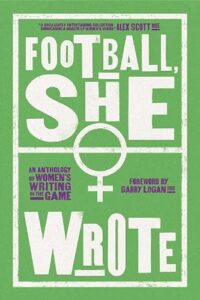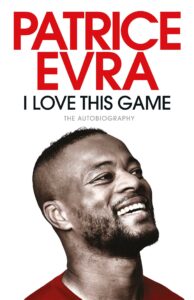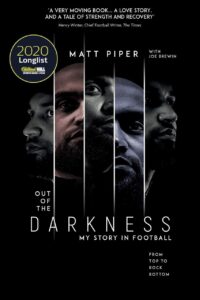Q&A with Jade Craddock. Part 1 – Writing and ‘Football She Wrote’ anthology
 FBR has some talented contributors, none more so that Jade Craddock who has been a regular writer for FBR with her insightful book reviews and additionally articles covering the delayed 2020 Euros and the start of the 2021/22 Premier League and Women’s Super League. Jade’s talents have been recognised with a chapter in Football She Wrote. As part of the launch of the book, FBR caught up with Jade to find out a bit more about her football and writing background. This first part of the interview looks at Jade’s involvement in writing and Football She Wrote.
FBR has some talented contributors, none more so that Jade Craddock who has been a regular writer for FBR with her insightful book reviews and additionally articles covering the delayed 2020 Euros and the start of the 2021/22 Premier League and Women’s Super League. Jade’s talents have been recognised with a chapter in Football She Wrote. As part of the launch of the book, FBR caught up with Jade to find out a bit more about her football and writing background. This first part of the interview looks at Jade’s involvement in writing and Football She Wrote.
FBR: Congratulations on getting published in the anthology. What can you tell us about the book?
Jade Craddock (JC): Thank you. I think I’m right in saying – at least I hope I am! – that Football She Wrote is the first book of its kind, the first anthology of women’s football writing, and that is something that is really exciting to me and something I’m hugely proud to be part of.
FBR: So how did you get involved in the book?
JC: Football She Wrote is the brainchild of Ian Ridley of Floodlit Dreams and Women in Football, who’d spotted a gap in football writing and realised there were plenty of women out there writing about football or wanting to write about it, so they got ten current female football writers on board and then launched a competition to find a further ten new female football writers to create an anthology of twenty new pieces of writing. I came across the competition one day and was inspired to enter. I had never written anything long-form before and never really thought about doing so, but the competition and the chance to be published gave me the motivation to do so. I’ve been writing football book reviews for a couple of years and been immersed in the sport for over twenty years as a player and a fan and spend a lot of time watching and thinking about football, so I figured I’d give the competition a go. If I got chosen, amazing; if I didn’t, I genuinely enjoyed exploring the area I chose to write about. I submitted the piece back in February, cautiously hopeful, and received an email in May to tell me my piece had been selected. From then on, it’s been a mad but exciting experience.
FBR: What is your chapter about and what was the inspiration behind writing it?
JC: I’m often thinking about football and tend to get a bit carried away in my own head, thinking of hypotheticals and different scenarios. I’m not sure what game I was watching or how exactly it came about, but I was wondering how the Premier League would look if instead of an eleven-a-side game, the format was five-a-side. Would the so-called big six still come out on top or actually would condensing the teams down erase the disparity? From there, I began thinking about what the ‘best’ Premier League five-a-side team would look like and realised there would probably be only a handful of names in the mix, but I wondered if there was another way of thinking about possible Premier League five-a-side line-ups that wouldn’t be the same-old, same-old, so I came up with a number of categories – most appearances, youngest, oldest, etc, and it snowballed from there. In the end, because of the word limit, I chose maybe ten or so categories, but I had a whole list of potential line-ups and there’d be some pretty good games in there if they ever came about!
FBR: What impact do you anticipate the book will have?
I just hope it gets seen, that even if people don’t read it or buy it, they may stop and take a look when they’re browsing for books and have a quick glance at what it’s about. That’s not to say I don’t want people to buy it, of course! But the most important thing to me is visibility. When I was younger, women’s football wasn’t visible and that really limited opportunities. Once you were aware of women’s football, it opened up so many more opportunities. In the same way, having a book written by women about football will hopefully make women’s football writing much more visible and open doors for those interested in it.
FBR: How did you get involved in writing?
JC: In truth, I don’t really feel as if I’m involved in writing necessarily. That may sound counterintuitive given that I have a chapter that I’ve written now published in a book, but I don’t suddenly see myself as a writer or part of a writing world. I obviously write book reviews pretty regularly and I have also written a range of pieces for FBR, and this brings me incredible satisfaction and is certainly something I plan to continue and develop, but outside of that I don’t write anything else. Whether that will change going forward, I don’t know. I certainly enjoyed writing this chapter, but it also gave me even greater respect for the authors whose books I review, having now experienced in miniature the time and effort that goes into it. I have lots of ideas but turning those into the finished article is the tricky thing!
FBR: You mentioned you have plenty of ideas, but what book would you most like to see written?
 JC: Cesc Fabregas’s autobiography – but only if I can write it! In all honesty, though, football writing – and sports writing more generally – is something I’m really passionate about, but which I also feel is grossly under published. There are a number of dedicated sports publishers, like Floodlit Dreams, Pitch Publishing, Reach Sport, etc, who do an incredible job of finding and publishing sports writing and lead the way, but they can’t do everything, and I think other publishers should be doing more to support sports writing and making sure it continues to grow. There are so many stories out there that just aren’t getting told; you only have to look at the number of football autobiographies published, for instance, and it’s just a tiny fraction of the football world.
JC: Cesc Fabregas’s autobiography – but only if I can write it! In all honesty, though, football writing – and sports writing more generally – is something I’m really passionate about, but which I also feel is grossly under published. There are a number of dedicated sports publishers, like Floodlit Dreams, Pitch Publishing, Reach Sport, etc, who do an incredible job of finding and publishing sports writing and lead the way, but they can’t do everything, and I think other publishers should be doing more to support sports writing and making sure it continues to grow. There are so many stories out there that just aren’t getting told; you only have to look at the number of football autobiographies published, for instance, and it’s just a tiny fraction of the football world.

I’m a great believer that every player – every person – has a story and they’re just out there waiting to be told. Look at any football club right now, and there’s some 25 to 30 first-team players, multiply that across the Premier League and that’s over 500 players, multiply that across the Football League and it’s over 2,000 players, yet probably only around 10 or 20 autobiographies are published each year. And that doesn’t even take into account the generations of players that have gone before – literally thousands of them. Of course, it may be that players don’t want to share their stories and that’s absolutely their right, but, conversely, I suspect there are a host that do. They may not be the seeming ‘stars’ of the game, but oftentimes these narratives offer the most important and interesting stories. Take Nicklas Bendtner, for example. He is probably not the first name on fans’ lips when it comes to football icons and autobiographies you’d want to read, but his is one of the most engaging, eye-opening and frank football books I’ve read. Similarly, Matty Piper, whose career ended prematurely, may be little known outside Leicester, but his is an incredibly important story about the darker side of football. Neither of these players are ones that would necessarily spring to mind when drafting a list of potential subjects for autobiographies, but they prove that there are a range of stories out there waiting to be told. It shouldn’t just be the big names, the success stories that are published, but books should reflect the many sides and experiences in football; players who’ve been let go, who’ve had to retire early, who’ve moved into different areas of the game, who’ve come back from injury, who’ve played in lower leagues. The best stories are not necessarily the most well-known, the most obvious, and with so many players past and present, the choice really is wide open. Of course, there is a commercial side to it, and I wouldn’t begin to suggest I have any knowledge of that – and, ultimately, books have to sell and make money, but I genuinely think there is a world of unpublished books out there that need to be found, published and promoted.
In terms of picking books that I would like to see published, autobiography-wise, there’s a number of female footballers I’d love to see in print – there’s whole generations of players from the seventies, eighties, nineties and even 2000s that were integral to the development of women’s football that have gone unrecognised and will surely have incredible stories to share.
In terms of men’s football, I’d love to see Freddie Ljungberg and Gilberto Silva, and of current players, Hector Bellerin and Jesse Lingard. I’m also a huge fan of the Micah Richards/Roy Keane bromance and surely there’s a book in that somewhere. Other stories from within clubs would be great to hear too; I know there’s a recipe book coming out shortly by Mona Nemmer – Liverpool’s head of nutrition – for instance, and it’s this sort of innovation and a different way of engaging with the reading public that is really great to see.
As for football writers, I devoured Daniel Gray’s backlist during lockdown and anyone who’s read my reviews on here will know I’m chomping at the bit for another book from him – he’s just a superb writer. So, in a rather convoluted way, my answer to the question is there’s no end of books I’d like to see written and there’s plenty I could suggest, but the best books are maybe not the ones you expect and that’s why the work of football publishers is so crucial.
FBR: To finish – if you were on a desert island what three football books would you take with you?

JC: I’m not really one for re-reading books and it would have to be a pretty amazing book for me to go back to it. There’s plenty of books that I’ve loved but, in truth, only one that I would choose to read again – How to be a Footballer by Peter Crouch. That would definitely make the desert island cut, not least because if I’m stuck on a desert island I’m going to need something to lift my spirits, and this is genuinely one of the funniest books I’ve read across all genres. I’m a big fan of stats and love to dive into records and the like, so my second pick would be something like England Players’ Records by Graham Betts. And finally, I’d have to have something new to read, so I’d probably pick Patrice Evra’s forthcoming autobiography, I Love This Game. Although, if I’m going to be stuck on the island for more than a week, I’d somehow have to find a way to get more books delivered, because I’d be lost once I’d finished reading those!
